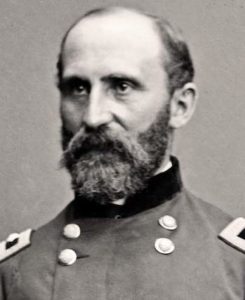
Rufus Saxton
*Rufus Saxton was born on this date in 1824. He was a white-American Union Army brigadier general.
Saxton was born in Greenfield, Massachusetts. His father, Jonathan Ashley Saxton, was a Unitarian and a Transcendentalist. His father attempted to secure Rufus Saxton a place at Brook Farm in West Roxbury, Massachusetts, a transcendentalist community started by George Ripley and attended by Nathaniel Hawthorne. Saxton was educated at the United States Military Academy at West Point, graduating in 1849.
His antebellum career included posts fighting Native American Seminoles in Florida, teaching artillery tactics at West Point, surveying the uncharted Rocky Mountains on George B. McClellan's staff in advance of the Northern Pacific Railroad (1853), and map work for the Coastal Survey. He was promoted to first lieutenant in March 1855. Saxton was an abolitionist and proponent of greater rights for Blacks. According to an account by his close friend, author Thomas Wentworth Higginson, Saxton "had been almost the only cadet in his time at West Point who was strong in anti-slavery feeling, and who thus began with resentments which lasted into actual service."
As the Civil War broke out, Saxton served as a quartermaster and ultimately a brigadier general for the Union forces. During the war, he commanded the Union defenses at Harpers Ferry and was awarded the Medal of Honor for his "gallant service" there in May and June 1862. Later, in 1862, he was appointed quartermaster of the South Carolina Expeditionary Corps based at Hilton Head during much of the Union occupation of the Island and was in charge of supplying contraband colonies in the region, including on Edisto Island and at Port Royal Saxton was later appointed military governor of the Department of the South. He directed the recruitment of the first regiment of black soldiers who fought in the Union Army.
Saxton appointed author and abolitionist Thomas Higginson, colonel of the 1st South Carolina Volunteers, the first official Black regiment. Saxton figures prominently in Higginson's book Army Life in a Black Regiment (1870). On the anniversary of the Emancipation Proclamation, Higginson and Saxton were presented with engraved silver ceremonial swords by the freedmen. After the Civil War, Saxton remained in the Army, serving in the Quartermaster Corps. Saxton later served as assistant commissioner for the Freedmen's Bureau, where he pursued the policy of settling freed slaves in land confiscated from white landowners in the Sea Islands until President Andrew Johnson removed him from his position.
Saxton married a Philadelphia missionary, Mathilda Thompson, who had come South to teach the newly freed Blacks with her newspaper journalist brother. In 1866, Saxton testified before Congress's Joint Committee on Reconstruction, saying, "I think if the Negro is put in possession of all his rights as a citizen and as a man, he will be peaceful, orderly, and self-sustaining as any other man or class of men and that he will rapidly advance." He retired in 1888 as a colonel and assistant quartermaster general and lived in Washington, D.C., until his death. He was a member of the Military Order of the Loyal Legion of the United States and the Sons of the American Revolution.
Rufus Saxton died on February 23, 1908. He was honored with a private memorial at Arlington National Cemetery. Battery Barlow-Saxton at Fort MacArthur is named in his honor.